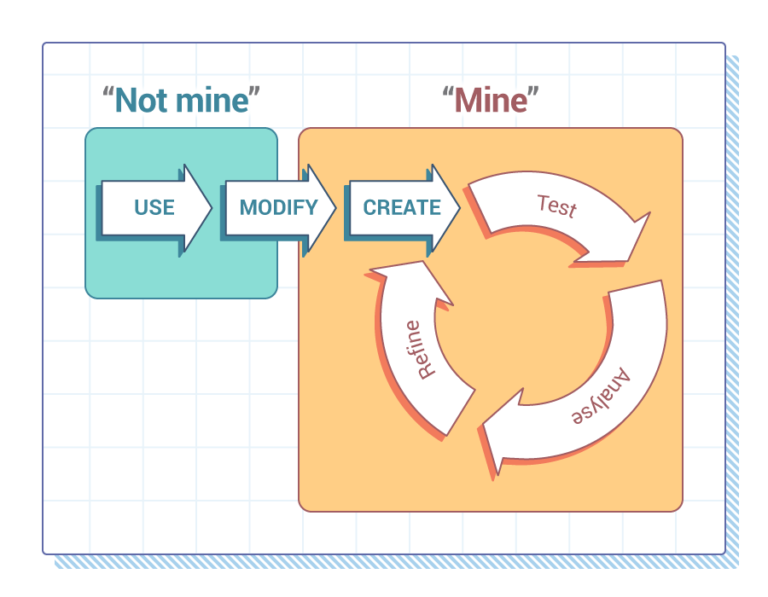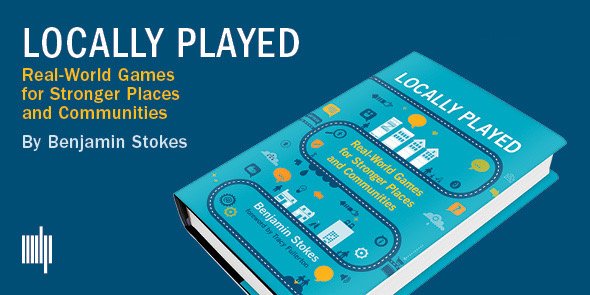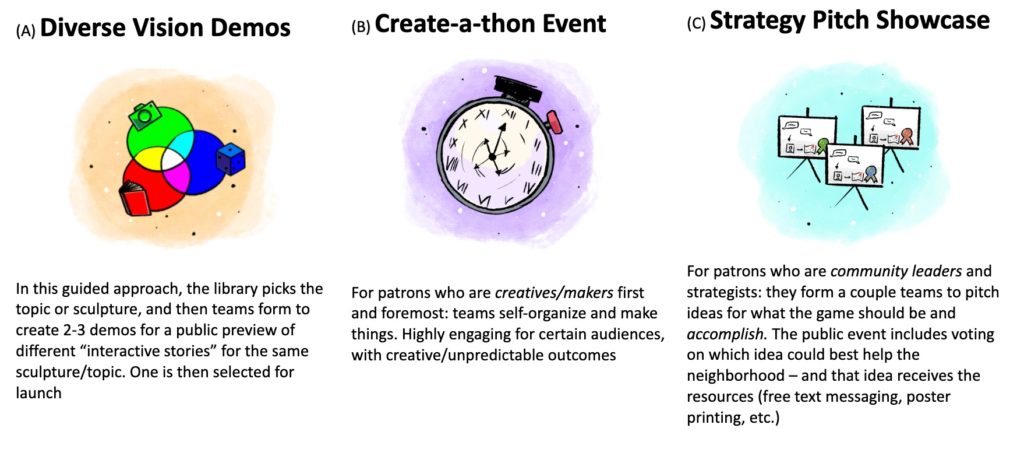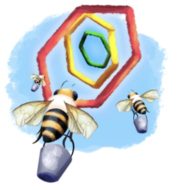Details on workshops for libraries
After reading program overview for libraries, you might be interested in more detail on the workshops below.
Curricular approach: “Use/Modify/Create”

Our goal for the workshops is to provide scaffolding for newcomers to almost immediately try our games and modify them. We want to avoid manuals and preachy training, and encourage doing — so we use a popular approach called “Use/Modify/Create.” This three-part sequence involves: (1) immediately USE a game that works, after watching a demonstration video and playing a version yourself — providing a very low entry threshold; (2) MODIFY game parameters, including for public use — which provides a gradual increase in learning and challenge as skills develop, with some games that are ready for launch almost instantly; and (3) CREATE: some residents will create entirely new game or interactive story, and publish the template for other libraries to use in our encyclopedia of library games.
Play as a strategy (in 5 minutes, without technology)

Research increasingly shows how play is a fundamental way to engage with the world — including for adults, and with no technology! Too often, public history and engagement in libraries defaults to a rather didactic approach. In just five minutes, we will show how some of the principles of play can be applied to storytelling and outdoor engagement. We draw on the recent book of one of our project leaders: “Locally Played” by Benjamin Stokes, who teaches game design for cities at American University.
$300 for materials, $150 for train-the-trainer
For each selected library, we offer $300 in materials support (typically shipped to you or prepaid for texting/voice), and $150 for one person at each site to receive special training in how to use Hive Mechanic. For details, see our FAQ.
Which type of workshop?
It’s up to you! To give you some templates to pick from, here are three ways that workshops can lead to public programs for libraries – including multiple games for the same sculpture, super creative “create-a-thons”, and highly strategic pitches from community partners and historians who want to be involved in the planning phase:

Will your patrons be more motivated by (a) history and local culture content, or (b) the technology and making? In our experience, the two can be like oil-and-water, so it helps to pick the right type for you. We can support either one.
Type A: Workshops for history fans, public art campaigns, and content partners
Your library might host this kind of workshop if your focus is on content and storytelling (not technology). Can you already picture the mural or sculpture at the center of your project? Or perhaps you have an archive with amazing photographs of local streets that could be used in a scavenger hunt. Attendees will try a working demo that we provide, then modify it by adding some local content — from photographs to audio clips. Then they will break into teams of 2-5 people (a good size for group projects) to brainstorm their story. Actual brainstorming will happen with index cards. Then one person from each team will use Hive Mechanic to create the “core loop” for their game (typically in 10-15 minutes, no programming skill required). After a live playtest, some teams may decide to continue working on their game at home or to propose it as a public program.
Possible agenda for a “low-tech” workshop
Here is one version, which each library can customize:
- DEMO: After introductions, we will demonstrate two working examples. Everyone will get to try the examples with their own cell phones, assuming they have service and text messaging.
- TRAINING: Then we will demonstrate “how it works” with a 2-minute video, and train everyone to use the Hive Mechanic tool in 10 minutes. (Yes, it really is that easy.)
- TEAMS: We recommend groups of 2-5 patrons. It’s more fun in teams, and you can draw on diverse perspectives and skills. Each team will pick a mural, historic topic, or content area of their choosing. Next they will pick one of our 2-3 templates for making a simple activity, and be ready for design.
- DESIGN: With our 2-minute video, we will show teams how to use index cards to plan their game on paper before touching any digital tools. The cards translate very quickly into Hive Mechanic, since it also uses ‘cards’ to organize content.
- TEST: Teams will spend under 10 minutes making their games in Hive Mechanic, and then they can immediately test them live.
- (If you have great local photographs or archival content, we recommend seeding the whole workshop with that material. See our optional guide for bringing local content to the workshop.)
EXTENSION: Some teams may want to stretch the interactivity, but still in a low-tech way. For those who are interested, we will show how to give different clues to each visitor so that they have to collaborate; or how to gather selfies from players in a scavenger hunt; using randomness for a raffle (with non-monetary/low value please!); tapping into weather or city bus data for real-time narratives; and more.
Type B: Workshops on “storytelling boxes” for technologists and library makerspaces
Alternatively, may want to host a workshop on “storytelling boxes” with technologies like Raspberry Pi, Makey Makey, arcade buttons, and more. This is for libraries with a focus at least partly on technology skills and/or you have a library makerspace.
- You will need one volunteer or staffer with at least intermediate tech skills so they can configure a Raspberry Pi.
- We can purchase hardware as part of the materials budget and send in advance (see FAQ for a list of options). Most likely, this kind of workshop might involve more consultation with our team — and possibly involve joining our nationwide network of Hive Mechanic Makers.
- Makerspaces as hosts. Makerspaces are already a strength for many diverse libraries, and places for all ages to make things with a DIY (do-it-yourself) attitude of self-empowerment and creativity. We anticipate libraries will choose to host approximately 15-30% of their workshops in makerspaces, for several reasons. One reason is to recruit within established event streams for makers and designers. For example, the new “crown jewel” of the DCPL is its renovated MLK Library, with a whole floor for maker space and media labs, including the “Memory Lab,” a DIY digital preservation lab that is already a national model and network with IMLS support.
How to prepare for a workshop
We recommend:
- Overview of your local digital assets — ideally matching the workshop focus. Can be a list of links to your website pages.
- Digital assets folder with JPGs etc ready to upload (and clear indication of copyright/use/attribution guidance…)
- Walk the location and take photos — this will help your attendees to situate themselves in the space, and prepare for clues like “Did you see the statue’s big hat?”
- Consider offering a “pre-workshop” time (e.g., 30 minutes) for those interested to dive into the folders and get familiar with the history content
